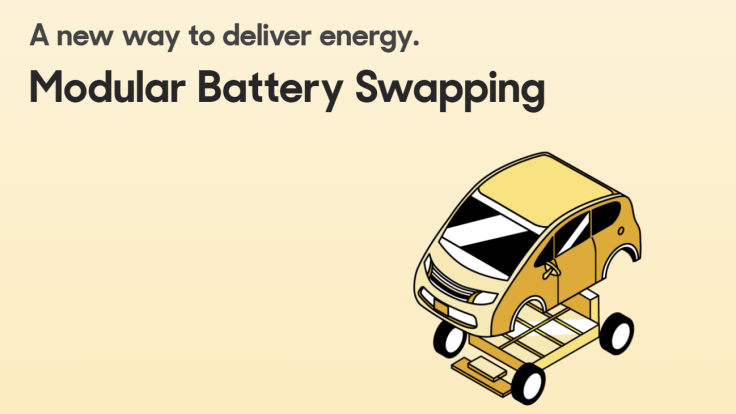John de Souza and Khaled Hassounah, the founders of Ample, a 2014 startup, are all set to take the rising market of electric vehicle to one level up with their ambitious battery swapping business model. 'Better Place', another start- up by entrepreneur Shai Agassi, was the first to conceptualize and offer to build network an automated battery swapping stations for replacing consumed batteries with fresh charged ones. But 'Better place' could not go far with their ambitious project. Now Ample seems to step in its shoes and run for it.
According to data available from Statista, the number of electric vehicles on roads has increased from 220,000 in 2013 to a whopping 4.8 million by 2019. With current environmental crisis, receding renewable energy supplies and worrying price hike of gas, EVs (electric vehicles) are the new addressable markets for companies to Ample to tap. The startup has already raised $70 million from investors to turn their vision of battery swapping into reality.
Modularization Of The Battery Pack

For Ample, the difference is in the modularization of the battery pack and how that changes the relationship with the automakers that would use the technology. Hassounah, Ample's co-founder and chief executive, said: "The approach we've taken... is to modularize the battery and then we have an adapter plate that is the structural element of the battery that has the same shape of the battery, same bolt pattern and same software interface. Even though we provide the same battery system... it's the same as replacing the tire." Ample does not approach by modifying the car instead they are only providing the plate. The choice is either to install a fixed battery system or an Ample battery plate.
Swappable Batteries; A Game Changer? Yay or Nay?
Presently the company is working with different OEMS (Original Equipment Manufacturer) for making swappable batteries for use, without altering the vehicle itself. With this seemingly sensible approach Ample has already validated its approach with nine different models of cars.
Ample has already announced its partnership with Uber and Uber's recent collaboration with Nissan on zero-emission mobility consequently hints at Ample's deal with Nissan for the Leaf. The founders of the company, though, have refrained from commenting on any deals with any OEM.
Uber is the first one to use Ample's robotic charging stations at a few locations in the Bay Area and it is just the first step according to Hassounah. Their company claims to accomplish a much cheaper and profitable economy which would cause 10-20% savings compared to gas. Another advantage claimed by the company is that it would only take weeks to build one charging pods at a facility and the company's charging drivers on energy delivered per mile. Ample's charging shall be cheaper than the traditional charging facilities and more because they offer price for solar energy till 2pm in the day.

Though the company is to reveal it cost per kwh will be, they are comparing to cars that cost about 12 cents/mile and thus seems to be willing to sell electricity for 10-11 cents/mile.
Target Industries
- Ample is now eyeing on fleets and municipalities, which prefers to be unmentioned as of now, to bring their cars to Ample's battery swapping system for a better and cheaper on road experience. Hassounah on behalf of his company has claimed to stage thousands of successful swaps with just Uber drivers.
- Long-haul trucks may prove to be another potentially fruitful market for Ample as the present electric long-haul trucks require a lot of batteries to get some range. It exhausts as much as the weight of 80,000lb limit of such a truck. Battery swap will enable it to use smaller batteries with shorter legs, swapping in stations at the side of the highway having less downtime for the truck and the trucker. Even stopping every couple of hours for a swap won't seem as a problem for automated trucks.
- Swapping could also prove beneficial for Robotaxis as they need to charge mid-day either face downtime on busy working hour. They even curb the profit on expensive power. In the solar future, the battery modules can charge itself from adequate solar power. Remote areas could can facilitate large solar and wind farms on vast empty land to use full potential of solar energy without a grid connection.
What Else Will It Achieve?
Ample's battery packs will also allow the cars to be charged at other traditional charging facilities rather than only in its own pods. The company's billing system will automatically detect the difference between the amount of energy it delivers and another charging outlet, thus act accordingly.
Until now it is the individual drivers who are paying for the use cases. But the company, with the five fleets to be deployed later this year, is expecting the managers and owner of the fleet to take the onus to pay.
"So far, in the use cases that we have, for ridesharing it's individual drivers who pay," said de Souza. With the five fleets that Ample expects to deploy with later this year the company expects to have the fleet managers and owners pay for charging. According Souza their battery swapping is only an essential solution for the fleet owners but also a great advantage of individual vehicle owners as well. Now if the battery has depreciated its life, the owner just needs to swap it with a fresh new one which not only gives the car a longer life but also keeps the value of the car upsurge.
As of now Ample is only installing their charging system in the OEMs sent cars that have no batteries in them. Once the number of cars having their system crosses to 1000 the company would amend their game a little. The Ample will send their battery plates to the manufactures itself where the system will be installed in their own packs.

But there are bumps in this ride too. Presently Ample only provides level one and level two charging. As of now it cannot propose fast charging to its car manufacturers because that comes with a peril. Fast charging will prove to be boomerang for the company's own aim by eventually diminish the demand of its own swapping technology. Also, the time for charging a car is also a matter of concern. Even now fast charging will take 20 and 30 minutes to charge a car which is more than a driver would likely to spend on its way. However, Ample is hopeful that technological advancement shall help to reduce this time. The founders of the companies keep their hopes high that even when fast charging becomes the relevant in the scenario, their services shall act as a stabilizing factor for faster electric vehicle adoption.
Fixing His Eyes On The Aim
Hassounah said: 'When you're moving 1 billion cars, you need everything... We have so many cars we need to put on the road. We think we need all solutions to solve the problem. As you think of fleet applications you need a solution that can match gas in charge and not speed. Fast charging is not available in mass. The challenge will not be if the battery be charged in five minutes. The cost of building chargers that can deliver that amount of power is prohibitive."
Ample's ambitions go beyond charging and swapping. It eyes for set its foot on the grid power market in near future. Souza gave a hint of the aim when he said: "Time shift is built into our economics... that's another way we can help. We use that as grid storage... we can do demand charge and now that the federal mandate is there to feed into the grid, we can help stabilize the grid by feeding back energy. We don't have a lot of stations to make a significant impact. As we scale up this year we will."
The company is functioning at a storage capacity of tens of megawatts per hour. According to the founders the side storage can facilitate to develop the swapping stations faster. This will not even cause draining a lot of money. The batteries can supposedly be financed in various ways while other sources of the finance be well put-on use elsewhere.
Well, as of now battery swapping technology has been only successfully done by China. If Ample succeeds to pull this off flawlessly it will surely get the fuel to strive more in the future.









